#phenomenology
Text

Jean-Paul Sartre, The Imaginary: A Phenomenological Psychology of the Imagination
103 notes
·
View notes
Text
I just had a riveting discussion with a self proclaimed anarcho-capitalist at work, whose opinions included:
Tipping is bad because 'contracts with your employer are voluntary and they can leave if they're not paid enough.' He will still tip if he thinks his wife is watching
If you're stuck inside a torture chamber with an apple you can bite every ten seconds that sends you to paradise for a year, it is illogical to bite the apple and humanity is broken for thinking so
The ending to the good place was bad because the characters weren't being logical and there was so much shit you can do with the afterlife.
The marxist labor theory of value 'isn't true' because paintings have arbitrary value
Heidegger was an idiot
Kant was an idiot
Nietzche was an idiot
He is an anarcho-capitalist
If I don't have 100% certainty for something than I can't truly say that I know something is true, and isn't it illogical that people do that?
I have to see this man every Monday from now until I quit. We work one on one.
#he was also horrified that i give credit to phenomenology despite not seeming to know what that is?#and now that i think about his stupid thing with the car i could just as easily use the sun as an example#and that would be even dumber#my god this man is a fool#and every single thing he said he followed up with 'and i know thats an unpopular opinion' like wtf you weird little edgelord#go read jordan peterson and leave me alone#he ended the conversation with 'i guess i didnt change your opinion' despite me not sharing any coherent opinions whatsoever#mans is getting off on 'rational debate' and im laughing in his face when he tells me 'marx's labor theory of value isnt true'#marx#heidegger#neitzche#anarcho-capitalist#communism#anarchism#capitalism#kant#the good place#thought experiments#i guess#phenomenology#simulation theory#maybe?#tipping#ethics#my fat tranny nuts
34 notes
·
View notes
Text

Arturo Obizzo
#Arturo Obizzo#photography#nature#landscape#animal#forest#cow#Kodak Kodacolor 200#film photography#analog#35mm#aesthetics#phenomenology
37 notes
·
View notes
Text
Furthermore, the very attempt to define how a philosophical work is supposed to be connected with other efforts to deal with the same subject-matter drags in an extraneous concern, and what is really important for the cognition of the truth is obscured. The more conventional opinion gets fixated on the antithesis of truth and falsity, the more it tends to expect a given philosophical system to be either accepted or contradicted; and hence it finds only acceptance or rejection. It does not comprehend the diversity of philosophical systems as the progressive unfolding of truth, but rather sees in it simple disagreements. The bud disappears in the bursting-forth of the blossom, and one might say that the former is refuted by the latter; similarly, when the fruit appears, the blossom is shown up in its turn as a false manifestation of the plant, and the fruit now emerges as the truth of it instead. These forms are not just distinguished from one another, they also supplant one another as mutually incompatible. Yet at the same time their fluid nature makes them moments of an organic unity in which they not only do not conflict, but in which each is as necessary as the other; and this mutual necessity alone constitutes the life of the whole. But he who rejects a philosophical system [i.e. the new philosopher] does not usually comprehend what he is doing in this way; and he who grasps the contradiction between them [i.e, the historian of philosophy] does not, as a general rule, know how to free it from its one-sidedness, or maintain it in its freedom by recognizing the reciprocally necessary moments that take shape as a conflict and seeming incompatibility.
Georg Wilhelm Friedrich Hegel, The Phenomenology of Spirit (Phänomenologie des Geistes), translated by A. V. Miller
#quote#Georg Wilhelm Friedrich Hegel#Hegel#philosophy#The Phenomenology of Spirit#Phenomenology of Spirit#phenomenology#The Phenomenology of Mind#metaphysics#ontology#systems#wholeness#unity#nature
64 notes
·
View notes
Text
To exist is to change, to change is to mature, to mature is to go on creating oneself endlessly.
Henri Bergson, Matter And Memory.
#philosophy tumblr#philoblr#french philosophy#french author#sorbonne#philosopher#henri bergson#metaphysics#phenomenology#ontology#transcendentalism#dark academia#life quotes
24 notes
·
View notes
Text
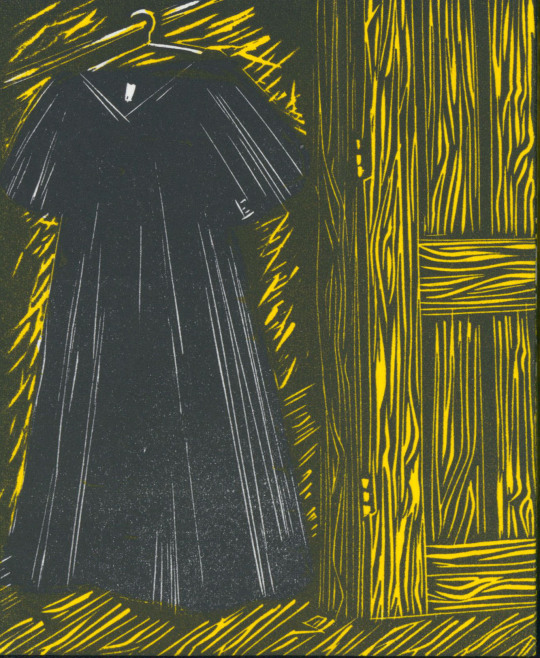
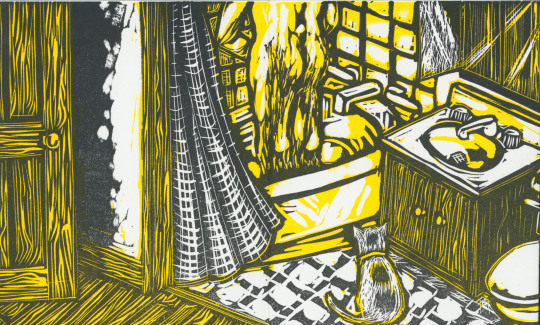
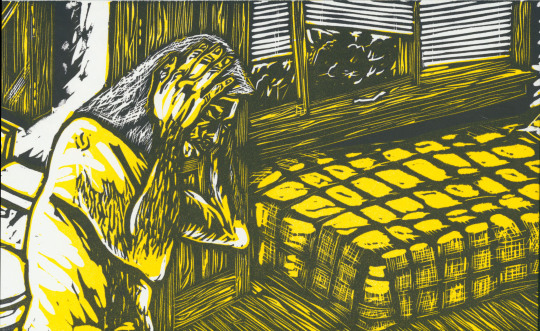
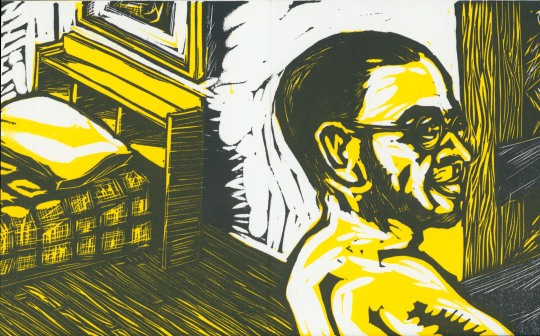
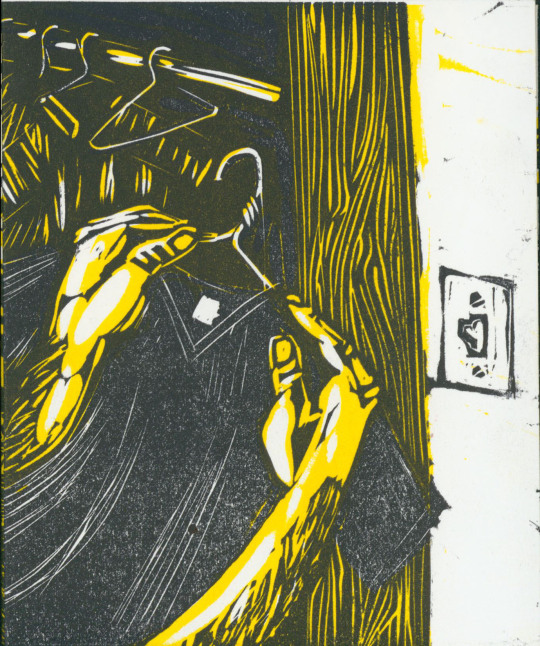
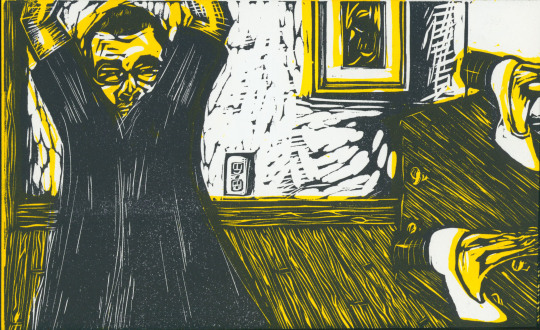
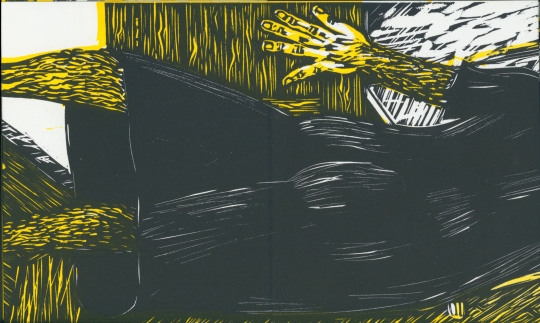
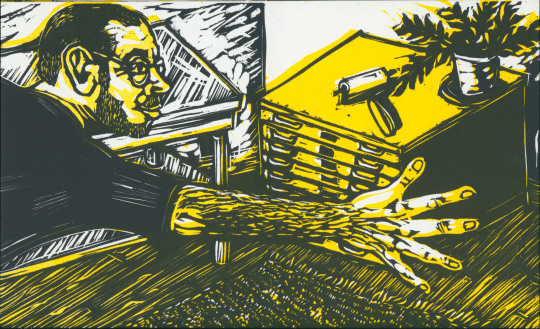
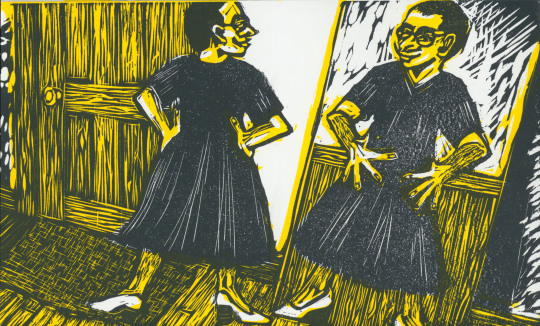
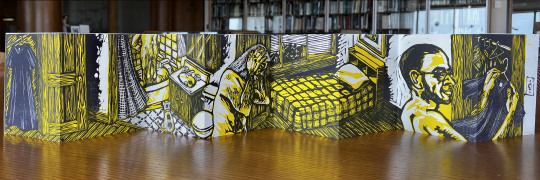

Good Bye!
This is my last post as Special Collections Graduate Intern. I am now a Master of Fine Arts and I am using this post as an opportunity to share some of my own work.
My Dress, is an accordion-folded artists book printed from four hand carved linoleum blocks. Two blocks on each side of the single sheet, yellow and a deep navy. Conceived of in 2021, published in 2023 as a small boxed edition of 4. This copy will be a part of the UWM Libraries' Special Collections.
The book was a part of my thesis exhibition, In Here, Out There. My exhibition was about the work of 'becoming' queer, work typically done in safe interior spaces, like our homes where we can play and experiment with our how we perform gender. The work of 'becoming' queer involves orienting oneself towards objects that allow you to imagine new possibilities of being. In this book that object is my dress that I carefully select from my closet and pull on over my head, I then joyfully fly through the apartment and the book to the mirror in which I appreciate the work I have done.
I will be staying in Milwaukee; I love this city and have an amazing supportive community here. I will have a studio at the House of RAD and I will be teaching workshops at Anchor Press Paper and Print! Including one on creating a linocut accordion fold book, much like this one. So, keep a look out!
Also, come and see Boyfriend Material, an exhibition of Queer Milwaukee based artists, including myself, curated by artist and curator, LaNia Sproles. Open May 22 – July 15, 2023 at the Brooks Stevens Gallery, located at MIAD, 273 East Erie Street, Milwaukee.
Follow my work on Instagram @teddylepley, and on my website Teddylepley.com.
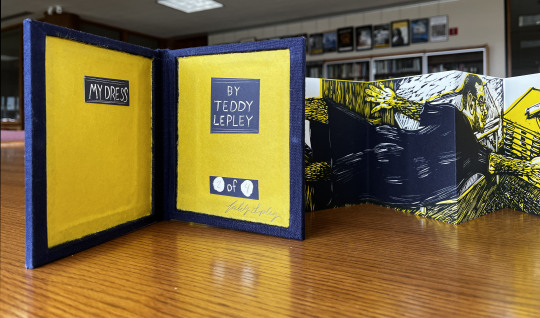
Read more posts by Teddy!
Read more Fine Press Friday Posts!
Thanks for reading!
Too-da-loo,
Teddy Dean Lepley III, M.F.A.
#queer art#queer artist#artists books#linocut#relief printmaking#printmaking#bookmaking#book art#artists#uwm special collections#my dress#teddy lepley#teddy#mfa#emerging artists#phenomenology#goodbye#fine press fridays#fine press friday#LGBTQ+#UWM LGBT Collection
86 notes
·
View notes
Video
i’ve been thinking about this for a week
142 notes
·
View notes
Text
The lover describes her tears and her tortures, but she asserts that she loves this unhappiness. It is also a source of delight for her. She likes the other to appear as another through her separation. It pleases her to exalt, by her very suffering, that strange existence which she chooses to set up as worthy of any sacrifice. It is only as something strange, forbidden, as something free, that the other is revealed as an other. And to love him genuinely is to love him in his otherness and in that freedom by which he escapes. Love is then renunciation of all possession, of all confusion. One renounces being in order that there may be that being which one is not.
Simone de Beauvoir, The Ethics of Ambiguity, p. 72
The tyrant does not care about love; he is content with fear. If he seeks the love of his subjects it is for political reasons and, if he can find a more economic way of subjugating them, he will adopt it at once. Contrary to this, the person who wants to be loved does not desire to subjugate the being he loves. He does not want to become the object of a boundless, mechanical passion. He does not want to possess an automatism, and if you want to humiliate him, you need only portray for him his loved one’s passion as the outcome of psychological determinism: the lover will feel devalued in his love and his being. His goal has been overshot: if the loved one is transformed into an automaton, the lover finds himself on his own. Thus the lover does not desire to possess his loved one in the way we can possess a thing: he demands a special type of appropriation. He wants to possess a freedom as freedom.
Jean-Paul Sartre, Being and Nothingness, 407/486
140 notes
·
View notes
Text
Theories of the Philosophy of Expression
The philosophy of expression explores the nature, significance, and implications of human expression in various forms, including language, art, music, and body language. It delves into questions about the origins of expression, its relationship to identity, culture, and society, and its role in human communication and understanding. Additionally, it examines ethical and aesthetic considerations surrounding expression, as well as the philosophical frameworks that underpin different modes of expression.
The philosophy of expression encompasses various theories and perspectives that seek to understand the nature and significance of human expression. Some prominent theories include:
Mimetic Theory: This theory, proposed by Plato and Aristotle, suggests that art and expression imitate or reflect reality. It emphasizes the role of art in representing the natural world and conveying universal truths.
Expressivism: Expressivism posits that expression, particularly in language and art, serves as a means for individuals to express their inner thoughts, emotions, and experiences. It emphasizes the subjective and personal aspect of expression, focusing on the individual's unique perspective.
Semiotics: Semiotics, developed by Ferdinand de Saussure and Charles Peirce, explores the study of signs and symbols and their interpretation. It examines how meaning is conveyed through linguistic and non-linguistic signs, highlighting the role of context and cultural conventions in interpretation.
Pragmatism: Pragmatist philosophers like John Dewey emphasize the practical consequences of expression. They argue that expression serves a functional purpose in communication and problem-solving, shaping social interactions and facilitating collective action.
Hermeneutics: Hermeneutics focuses on the interpretation of texts and cultural artifacts, including literary works, religious texts, and artistic expressions. It examines the process of understanding and meaning-making, considering the role of context, tradition, and the interpreter's perspective.
Aesthetic Theory: Aesthetic theories, developed by philosophers like Immanuel Kant and Arthur Schopenhauer, explore the nature of beauty and artistic experience. They examine how aesthetic judgments are formed, the criteria for evaluating art, and the relationship between art and morality.
Phenomenology: Phenomenological approaches, as developed by Edmund Husserl and Maurice Merleau-Ponty, explore the lived experience of expression. They focus on the first-person perspective and the embodied nature of expression, examining how individuals perceive, interpret, and engage with the world through expression.
These theories offer diverse insights into the complexities of human expression, highlighting its multifaceted nature and its significance in shaping individual and collective experiences.
#philosophy#epistemology#knowledge#learning#chatgpt#education#ontology#metaphysics#psychology#Philosophy of language#Philosophy of art#Philosophy of music#Body language#Communication#Identity#Culture#Aesthetics#Ethics#Human experience#Mimetic theory#Expressivism#Semiotics#Pragmatism#Hermeneutics#Aesthetic theory#Phenomenology#Interpretation#Meaning-making
8 notes
·
View notes
Text
“We don't walk down the same street as the person walking beside us. All we can do is tell the other person what we see. We can point at things and try to name them. If we do this well, our friend can look at the world in a new way. We can meet.”
Anne Enright, “The Wren, The Wren”
10 notes
·
View notes
Photo
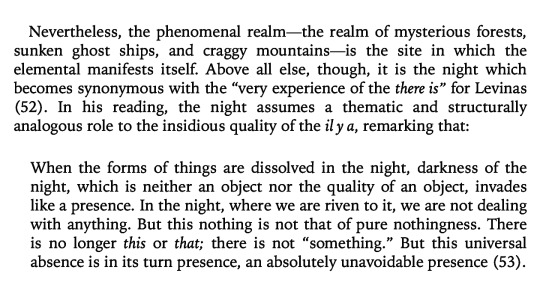
Dylan Trigg, The Thing: A Phenomenology of Horror
195 notes
·
View notes
Text
Sharing my perspectives on life
Hello! For todays post, I do want a little help to find out what philosophical perspective I align with the most. I think my perspective falls within the scope of existentialism, but I need some confirmation. It would be lovely if you guys could provide me with answers, it’s fine if you can’t, I’m sure I’ll figure this dilemma myself eventually :) My beliefs and experiences are what influenced this perspective, I don’t really dismiss these existential thoughts; I try to find more truth to it; now look what happened ‼️

I believe we were put here for a purpose albeit no purpose at the same time. However, we still don’t know the answer truly, so we try to make sense of it all by endeavouring to live on and do our search for both individuality, and finding true meaning/purpose in life
For more understanding on my point of view, I’m trying to live so I can completely experience the full spectrum of life, even if it’s still incomprehensible I can still try to make something out of it. Nonetheless, I often feel no sense of purpose and worthiness in life, therefore making me feel a little despondent sometimes. I feel as if I am trying to cope with the meaninglessness of life by saying that I will try to find meaning and make my own worth
But then us humans compared to the entirety of the universe, we are nothing, and consequently that makes us ultimately useless. Our existence is extremely confusing and illogical. Therefore, us humans aren’t needed. But knowing this “society”, we try to find something to fill what is devoid of meaning by giving ourself what our rightful positions are in this existence.
I’m sure that this is all I can say for now! My views will keep improving and changing, so I might make updates on this post? 😭 Let me know what you little philosophers think
#Philosophy#perception#understanding#reality#meaning#phenomenology#Philosophical perspectives#paradox of human existence#What we mean#peculiarities
5 notes
·
View notes
Text
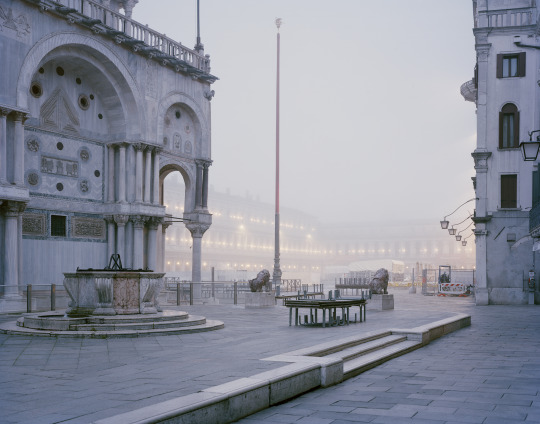
Felix Odell
Venedig, 2024
#Venezia#Venedig#Venice#Italia#Italy#Europe#travel#San Marco#fog#mist#street photography#photography#city#history#dusk#sunrise#phenomenology#mood#Felix Odell
7 notes
·
View notes
Text
Artist Statement, Antony Gormley
Things already exist
Sculpture already exists
The job is to transform what exists in the outer world
by uniting it with the world of
sensation, imagination and faith.
Action can be confused with life.
Much of human life is hidden.
Sculpture, in stillness, can transmit what may not be seen.
My work is to make bodies into vessels
that both contain and occupy space.
Space exists outside the door and inside the head.
My work is to make human space in space.
Each work is a place between form and formlessness,
a time between origin and becoming.
A house is the form of vulnerability,
darkness is revealed by light.
My work is to make a place, free from knowledge,
free from history, free from nationality to be experienced freely.
In art there is no progress, only art.
Art is always for the future.
Published in Antony Gormley: Five Works, Serpentine Gallery, London: Arts Council of Great Britain, London, 1987 (source)
47 notes
·
View notes
Text
Wickedness also resides in the gaze that perceives itself as innocent and surrounded by wickedness.
Georg Wilhelm Friedrich Hegel, Source Unlisted.
#philosophy tumblr#philoblr#german philology#philosopher#hegel#dialectics#hegelian dialectic#problem of evil#metaphysics#conuintio oppositorun#phenomenology#meta ethics#existentialism#dark academia#life quotes
78 notes
·
View notes
Text
“Even if it is not explicitly conscious, I live in a context of anticipation. Unbroken, without having to surmount barriers, I slide from one encounter into another, and one sinks into the other, and indeed in such a way that I do not bother about it. I do not at all conceive of the idea that there is anything to notice anyway. I swim along with the stream and let the water and the waves crash behind me. I do not look back, and living into the next one, I do not live in the encounter that has just been lived, or know about it as having just been lived. I am engrossed in the temporally particular situation and in the unbroken succession of situations and to be sure in that which encounters me in the situations. I am engrossed in it, i.e. I do not view myself or bring myself to consciousness: now this comes along, now that. But in that which comes, I am captured and arrested, fully, and actively living it. I live the context of meaningfulness, which is produced as such in and through my experiencing, insofar as I am just swimming here and there in this direction of expectation.”
—Heidegger
#spirituality#heidegger#philosophy#metaphysics#Freiburg lectures#phenomenology#phenomenological research#consciousness
10 notes
·
View notes